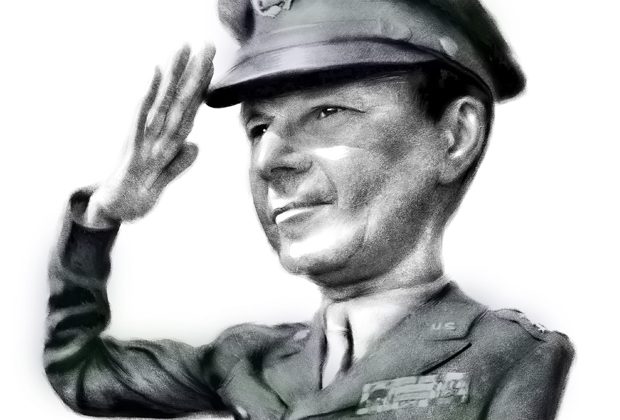A Salute to General Devers

The subtitle of this book is as straightforward and unpretentious as its subject. Yet James Scott Wheeler has given us something more than simply a comprehensive account of one general’s life. By resurrecting a notably underappreciated World War II four-star, he provides readers with an insightful appraisal of American military leadership in wartime.
True military geniuses are as rare as genuinely enlightened statesmen, a judgment as applicable to the United States as to any other great power, ancient or modern. Since Grant and Sherman combined their very formidable talents to roll up the Confederacy, no more than two Americans have earned a permanent place in the ranks of history’s Great Captains: George S. Patton in World War II and Matthew B. Ridgway in Korea.
General Jacob Loucks Devers (1887-1979) was not a Great Captain. Yet he was an officer whose estimable record of service helps us understand the strengths and limitations of American generalship in the war against Nazi Germany. A son of York, Pennsylvania, Devers graduated from the U.S. Military Academy in 1909—Patton was a classmate—and received a commission in the field artillery.
The first 30 years of his service are notable primarily for one thing: he stuck with it. Apart from the abbreviated emergency of World War I—like many other regulars, Devers was kept stateside to train the citizen-soldiers who actually fought in France—he rotated through the usual schools and troop assignments, endured low pay and slow promotion, yet seemingly never had any second thoughts about soldiering on. With other members of the miniscule U.S. Army officer corps, he assiduously studied war with no reason to expect that the United States would ever again actually engage in one.
Where Devers did stand out was in his ability to get things done. Although not a visionary, he had a knack for sizing up a problem, quickly devising a solution, and getting on with it. When the outbreak of war in Europe in 1939 prompted the United States to rearm, Devers was precisely the sort of officer that a rapidly expanding and radically changing army needed. He got things done. A recently minted colonel in 1940, within the next two years he ascended to the rank of lieutenant general and became one of Army chief of staff George C. Marshall’s go-to guys. Wheeler, himself a former professional soldier and longtime member of the history faculty at West Point, does an especially effective job of describing Devers’ contributions during this period—bolstering defenses in Panama, standing up the 9th Division while simultaneously building Fort Bragg, and presiding over the creation of the embryonic Armored Force at Fort Knox. Everything happened on a crash basis and a massive scale.
At Bragg, in just over a hundred days Devers oversaw the construction of 586 buildings, to include 253 barracks, 80 mess halls, 11 infirmaries, 10 PXs, and several movie theaters. At Knox, it fell to Devers to design, organize, and equip a force ultimately consisting of 14 armored divisions and 25 separate tank battalions—a huge undertaking launched in less time than the present-day Pentagon requires to organize marksmanship training for a few hundred Iraqis.
Such prodigious achievements found favor with Marshall, who by 1943 had dispatched Devers to Europe. There he held a series of posts that made him second in importance only to Eisenhower among American officers in the theater. This proved a mixed blessing, however. As Wheeler demonstrates, Ike viewed Devers as a threat—a Marshall favorite poised to assume the top spot in the event he himself stumbled. The effect was to poison relations between the two officers. Nothing that Devers could do was going to win Ike’s favor. Indeed, the better his performance, the less likely he was to gain Ike’s trust and confidence.
 When Devers assumed command of Sixth Army Group (AG) in mid-September 1944—the pinnacle of his career—this dysfunctional relationship had implications for the war’s conduct. Sixth AG controlled the American and French forces that landed in southern France two months after Operation Overlord had commenced up in Normandy. At least nominally, the appointment made Devers co-equal to Omar Bradley, commanding the U.S. Twelfth AG, and Bernard Montgomery, commanding the British-Canadian Twenty-First AG, all under Ike’s overall direction.
When Devers assumed command of Sixth Army Group (AG) in mid-September 1944—the pinnacle of his career—this dysfunctional relationship had implications for the war’s conduct. Sixth AG controlled the American and French forces that landed in southern France two months after Operation Overlord had commenced up in Normandy. At least nominally, the appointment made Devers co-equal to Omar Bradley, commanding the U.S. Twelfth AG, and Bernard Montgomery, commanding the British-Canadian Twenty-First AG, all under Ike’s overall direction.
In reality, however, Eisenhower agreed to elevate Devers to this post in order to marginalize him. Ike treated Sixth AG as something of an unloved stepchild, offering it little by way of care or affection. As a result, as Wheeler makes clear, the Supreme Commander failed to appreciate the magnitude of the problems that Devers successfully dealt with, not only orchestrating a successful offensive through the Vosges Mountains against stiff German resistance but also smoothing the easily ruffled feathers of imperious French commanders like Jean de Lattre de Tassigny, who fought for purposes that overlapped with but were not identical to those of the Anglo-Americans.
Of course, Ike’s inattention to Sixth AG, compounded by his animus toward Devers, did not affect the conflict’s ultimate outcome. Arguably, however, it blinded Eisenhower to opportunities available along his southern flank that may have shortened the war. Certainly, prejudices indulged by the Supreme Commander shaped and thereby distorted the subsequent American narrative of the Great Crusade, which assigned pride of place to those who fought under Bradley and Patton—both of whom joined Ike in disliking Devers—while largely ignoring the exploits of Sixth AG.
Readers may wonder how Devers managed to rub his contemporaries the wrong way. Put simply, he was not politically adept. Unlike the selectively obsequious Patton, a world-class suck-up when it served his purposes, his own efforts to curry favor came across as clumsy and transparent. And although ambitious enough, Devers seemingly believed that results would ultimately speak for themselves. To put it another way, he lacked an aptitude for effective self-promotion.
Nor did he make for especially good copy. In contrast to the ostensibly genial and avuncular Ike, the supposedly modest and self-effacing Bradley, and Patton the self-proclaimed warrior transported from an earlier age, Devers did not cultivate a persona designed to win favorable press attention and thereby give lazy or gullible historians a convenient handle for storytelling. Rather than colorful, he was brisk, efficient, and inclined to share credit with subordinates instead of hogging the limelight.
All of that said, in each of the posts to which fate and George Marshall assigned him, Devers demonstrated versatility, thoroughgoing competence, and a capacity to adapt. These, rather than Napoleonic brilliance, were the hallmarks of American generalship in World War II. Patton apart, few of the senior U.S. commanders who took on Hitler’s war machine demonstrated the flair shown by the Wehrmacht’s very best field commanders. When serving in a capacity for which he was suited, however, the average American general more than held his own.
The key was to find the right fit. We may be thankful that Patton was never charged with orchestrating an allied theater—he would have been a disaster. In command of a corps or field army, Ike would have been mediocre at best. Devers stands out as an officer who excelled in an impressively wide variety of positions. He did not do one thing well; he did many. In this engaging biography he at last receives the recognition that has long been his due.
Andrew J. Bacevich is writing a military history of America’s war for the Greater Middle East.
Comments